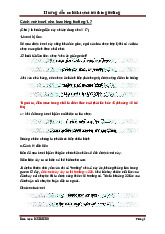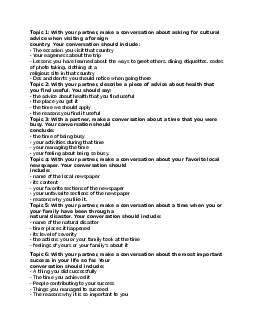













Preview text:
lOMoARcPSD|36041561
Dr. Christopher Denis-Delacour/Global Language English as a Global Language:
The Inner, Outer, and Expanding Circles Name : Date :
DIALECT, STANDARDIZATION, AND LANGUAGE USE IN GROUP ACTIVITY 1 Instructions:
In group read the 2 following statements then reflect on the
following questions - Take notes of the comments and key ideas of
your discussion below the 2 extracts.
- In terms of Attitude and Judgements, what are the consequences of
standard and varieties? Provide examples related to industry/job
contexts. What is the future of varieties of English?
- Is the English Standard inclusive and matching with the language
use around the world? According to the history of English, what will
be the future of Standard English? Provide examples. Statement 1
The Prince of Wales highlighted the threat to “proper” English from the spread of
American vernacular yesterday as he launched a campaign to preserve the language as
world leader. He described American English as “very corrupting” and emphasised the
need to maintain the quality of language, after giving his backing to the British
Council’s English 2000 project . . . Speaking after the launch, Prince Charles
elaborated on his view of the American influence. “People tend to invent all sorts of
nouns and verbs, and make words that shouldn’t be. I think we have to be a bit careful,
otherwise the whole thing can get rather a mess.” 1 English a Global Language
Downloaded by Nga T??ng (ngahuong55@gmail.com) lOMoARcPSD|36041561
Dr. Christopher Denis-Delacour/Global Language
(The Times, 24 March 1995) Statement 2
Language standards are rarely contested, even by those who are engaged in radical
and far-reaching social critique. Yet, standards discriminate against those who don’t
conform, and language standardisation has systematically worked against the
underclass as well as women and minorities . . . The existence of standards, however
objectionable, cannot be denied, so the only viable option, politically at any rate, is to
work towards broadening the standard to include the greatest variety possible,
particularly the ‘uneducated’ arenas of usage which have so far been considered
inappropriate, mistaken, even pathological. (Parakrama 1995: back cover)
Take notes of the group discussion:
………………………………………………………………………………
………………………………………………………………………………
………………………………………………………………………………
………………………………………………………………………………
………………………………………………………………………………
………………………………………………………………………………
………………………………………………………………………………
………………………………………………………………………………
………………………………………………………………………………
………………………………………………………………………………
……………………………………………………………………………… 2 English a Global Language
Downloaded by Nga T??ng (ngahuong55@gmail.com) lOMoARcPSD|36041561
Dr. Christopher Denis-Delacour/Global Language
Exploring historical and socio-political aspects
of English in additional contexts IN GROUP ACTIVITY 2
1. After learning about the historical facts of the spread of English around
the world and their interpretations by scholars in session 2 and 3, you
may be curious about the historical development of English in specific
regions of interest for you. We encourage you to establish a timeline for
the historical development of English language in your own group
research, presentation, or learning contexts1. Moreover, it is important to
understand the spread of English in your own country, Vietnam.
A. Historical Overview of English in Spain
1945 - English makes its way into the Spanish education system
1990 - The starting age to learn English is lowered 1996 - Bilingual experiment
1999 - First steps of English at preschool level
2005 - The starting age to learn English is lowered again
2006 - English is the most studied foreign language
2010 - Growing presence of English as a medium of instruction
B. Historical Overview of English in Taiwan 1895 - Japanese colony
1945 - The beginning of English language education
1968 - The first foreign language in education
1997 - Expansion of English language education
2002 - Internationalization of Higher Education
2002 - A reconsideration of the status of English
1 For instance, we can find 2 very different historical timelines examples providing an overview of the
introduction and development of English can be found in the contexts of Taiwan (Chen 2006, 2010) and Spain
(Enever 2007; Madrid 2001; Oukhiar 2010). 3 English a Global Language
Downloaded by Nga T??ng (ngahuong55@gmail.com) lOMoARcPSD|36041561
Dr. Christopher Denis-Delacour/Global Language
In group, try to answer the following questions:
When was English language introduced to your country? How? By whom? In what domains?
Do you observe any status shifts of English language in relation to other
foreign and local languages? How about changes in terms of the functions or domains for which it is used?
Can you identify what may have been the motivations or interests behind the
introduction, status shifts, and/or current uses of English in the given context?
2. Taiwan proposal to make English a ‘semi-official’ language in the country was
made by the political party in government in 2002, although the proposal was
put on hold at the parliament due to unfeasibility concerns. Similar proposals
for making English an official second language have been made in Japan and Korea:
In group, try to answer the following questions:
What may be motivating these contexts to consider this change in their ‘status
relationship’ with English? (e.g. to politically abrogate the current official
language and culture; to facilitate the smooth communication between local
people and international business partners, to create an English-friendly
environment for international people).
What would the implications be if English becomes a co-official, semi-official,
or quasi-official language in these contexts? (e.g. benefits, risks, transformative effects) 4 English a Global Language
Downloaded by Nga T??ng (ngahuong55@gmail.com) lOMoARcPSD|36041561
Dr. Christopher Denis-Delacour/Global Language
Would you support such a proposal for these countries? And if the idea of
making a ‘foreign’ language official was considered by your own context? Why/why not?
Rethinking language models and labels IN GROUP ACTIVITY 3
A. You had the opportunity of observing how the most influential
representations of English, its spread, and its use have been
changing over time; how certain models have been criticized,
altered, or succeeded by newly developed ones. Studies on the
international spread of English have encouraged a great deal of
rethinking of the constructs and terms we use to conceptualize
language(s). In the following quote, Pennycook elaborates on
the necessity for scholars to constantly reconsider our approaches to language:
“As we analyse and promote critical/transgressive approaches to
applied linguistics, we must always be wary lest the very terms and
concepts we use are at the same time doing damage to the
communities we are working with.” (Pennycook 2007: 39)2 Questions:
According to your experience, do you find people often label
instances of English language use as belonging to a specific
variety or (speech/imagined) community?
2 Pennycook, A. (2007) Global Englishes and Transcultural Flows, Abingdon & New York: Routledge. 5 English a Global Language
Downloaded by Nga T??ng (ngahuong55@gmail.com) lOMoARcPSD|36041561
Dr. Christopher Denis-Delacour/Global Language
In English class, have you ever been asked (or, if you are a
teacher, have you asked students) to use or avoid a specific
word or linguistic expression on the grounds that it corresponds
with/deviates from a pre-determined variety or ‘kind’ of English use (i.e. ENL, ESL, EFL)?
Do you think it is appropriate to categorize English in
accordance with terms suggested in the field such as ESL, ENL,
EFL, or Inner, Outer and Expanding Circles?
B. Regarding Kachru circles model, let’s look at a more concrete
example. Nickels (2005)3 explores the sociolinguistic profile of
English in Puerto Rico. Although the author attempts to
undertake the analysis from a Kachruvian perspective, her
findings seem to challenge the suitability of the very own
model and categories employed to frame the analysis, and concludes that:
“Puerto Rico appears to be ‘between’ circles, as far as the forms and
functions of English are concerned. […] Also, in terms of the ESL/EFL
status, McArthur (1998: 53) places Puerto Rico under the heading of
ESL countries based on the official status of English. Thus, there
seems to be conflicting estimations about English in Puerto Rico.” (Nickels 2005: 234) Question:
3 Nickels, E. (2005) ‘English in Puerto Rico‘, World Englishes 24/2: 227–237. 6 English a Global Language
Downloaded by Nga T??ng (ngahuong55@gmail.com) lOMoARcPSD|36041561
Dr. Christopher Denis-Delacour/Global Language
Are you aware of any region or context of use in which the
sociolinguistic realities of English do not neatly match current
influential categories (e.g. varieties/circles)? If yes, how can you
explain or deal with English in such contexts?
Take notes of the group discussion:
………………………………………………………………………………
………………………………………………………………………………
………………………………………………………………………………
………………………………………………………………………………
………………………………………………………………………………
………………………………………………………………………………
………………………………………………………………………………
………………………………………………………………………………
………………………………………………………………………………
………………………………………………………………………………
………………………………………………………………………………
………………………………………………………………………………
………………………………………………………………………………
………………………………………………………………………………
………………………………………………………………………………
……………………………………………………………………………… 7 English a Global Language
Downloaded by Nga T??ng (ngahuong55@gmail.com) lOMoARcPSD|36041561
Dr. Christopher Denis-Delacour/Global Language
………………………………………………………………………………
………………………………………………………………………………
………………………………………………………………………………
………………………………………………………………………………
………………………………………………………………………………
……………………………………………………………………………… FURTHER ACTIVITIES
Deconstructing language choice and the
spread of English, African perspectives INDIVIDUAL ACTIVITY 1
In the previous lecture, we discussed the spread of English in the African continent.
Regarding this phenomenon, Rubagumya4 explores in detail the relationship
between ‘choice’ and the spread of English in Africa and Tanzania in particular.
According to him, “[s]everal scholars argue that … individuals and
communities choose to acquire a new language because it is in their interest to do
so”. Rubagumya then distances himself from this position, and problematises the
idea of ‘spread by choice’ of those acquiring English as follows:
1. "European languages were imposed on Africa during the colonial period.
African people as communities did not choose to learn those languages […]
2. Individual Africans do not necessarily choose to learn these languages. Since
the language of instruction in almost all African countries is the language of
4 Rubagumya, C.M. (2004) ‘English in Africa and the emergence of Afro-Saxons:
globalization or marginalization?’, in Baynham, M., Deignan, A., and White, G.
(eds) Applied Linguistics at the Interface: Selected Papers from the Annual Meeting
of the British Association for Applied Linguistics, London: Equinox. 8 English a Global Language
Downloaded by Nga T??ng (ngahuong55@gmail.com) lOMoARcPSD|36041561
Dr. Christopher Denis-Delacour/Global Language
the former colonial power, going to school does not leave any choice to
individual students as to which language they would like to use. […]
3. Individuals that do not go to school, and therefore do not learn European
languages, do not choose not to go to school. They do not have access to schooling […]”.
Rubagumya concludes that “saying that English came to Africa by choice – whether
of communities or individuals, is to distort history” (ibid.: 134). Yet, later on the author
concedes that “[i]t might be the case that this imposed language was seen as
beneficial and therefore people continued to use it for the purposes for which it was not originally intended”. CRITICAL THINKING:
Do you think that the continuation of using English in postcolonial times can
be considered a ‘choice’ rather than imposition, albeit one made by African elites?
Do you think non-elite families and children have any degree of ‘choice’ in the
take up or avoidance of using/learning English in British postcolonial contexts in Africa?
Can you identify potential constraints to ‘choosing’ to learn/use English by the
majority of people in the above cited context? Are the effects of the language
choices available likely to influence the decisions we may be able to make? If so, how?
Rubagumya (2004: 134) indicates, “one might, of course, say cynically that
those who don't want to learn European languages should not go to school”.
Do you agree that ‘not going to school’ as a form of resistance to an imposed
language choice is the only option for students in the mentioned context? If
your answer is no, in what ways would it be possible for students/teachers to resist? 9 English a Global Language
Downloaded by Nga T??ng (ngahuong55@gmail.com) lOMoARcPSD|36041561
Dr. Christopher Denis-Delacour/Global Language
According to Ferguson (2012: 478) “[m]ost choices, down to the most banal,
are constrained but can still contain those elements of deliberation and
selection that are criterial for agency”. What do you think?
In your experience, could you ‘choose’ to learn English? Is it likely for learners
in your context to be able to ‘choose’ the language they want to learn nowadays? Why/why not?
ENGLISH LANGUAGE AND COUNTRIES FACT SHEET5 IN GROUP ACTIVITY 4 Research:
Work in groups. Each group draws a country and uses the Internet to find the
information asked for in the boxes below. Scotland is given as an example here.
There may be many different answers for culture, music, film, and sport so choose
options that you feel tell you something about the country, or which are typical for the country.
Present your findings to the whole class. You can collect all the answers in a
shared document that everyone has access to.
Copy and paste the country you are working on into your text editor. 5 Competence goals:
-write different types of formal and informal texts, including multimedia texts with structure
and coherence that describe, discuss, reason and reflect adapted to the purpose, receiver and situation.
-use different sources in a critical, appropriate and verifiable manner. 10 English a Global Language
Downloaded by Nga T??ng (ngahuong55@gmail.com) lOMoARcPSD|36041561
Dr. Christopher Denis-Delacour/Global Language Scotland: England: Capital: Edinburgh Capital:
Official Languages and Dialects: English, Gaelic
Official Languages and Dialects:
Why do they speak English? Because most of the Why do they speak English?
population descend from the Anglo Saxons. Some Political system:
also speak Gaelic or Scots (a local variation of Culture: English) Music: Film:
Political system: Constitutional monarchy, has its Sport:
own Parliament with some self rule
Culture: Clans, kilts, whisky, haggis Music: Bagpipes, Amazing Grace Film: Braveheart
Sport: Rugby, golf, Highland Games Wales:
Republic of Ireland (EIRE): Capital: Capital:
Official Languages and Dialects:
Official Languages and Dialects: Why do they speak English? Why do they speak English? Political system: Political system: Culture: Culture: Music: Music: Film: Film: Sport: Sport: The USA: Australia: Capital: Capital:
Official Languages and Dialects
Official Languages and Dialects: Why do they speak English? Why do they speak English? Political system: Political system: Culture: Culture: Music: Music: Film: Film: Sport: Sport: New Zealand: Botswana: Capital: Capital:
Official Languages and Dialects:
Official Languages and Dialects: Why do they speak English? Why do they speak English? Political system: Political system: 11 English a Global Language
Downloaded by Nga T??ng (ngahuong55@gmail.com) lOMoARcPSD|36041561
Dr. Christopher Denis-Delacour/Global Language Culture: Culture: Music: Music: Film: Film: Sport: Sport: South Africa: The Philippines: Capital: Capital:
Official Languages and Dialects:
Official Languages and Dialects: Why do they speak English? Why do they speak English? Political system: Political system: Culture: Culture: Music: Music: Film: Film: Sport: Sport: India: Jamaica: Capital: Capital:
Official Languages and Dialects:
Official Languages and Dialects: Why do they speak English? Why do they speak English? Political system: Political system: Culture: Culture: Music: Music: Film: Film: Sport: Sport:
Northern Ireland (Ulster): Uganda Capital: Capital:
Official Languages and Dialects:
Official Languages and Dialects: Why do they speak English? Why do they speak English? Political system: Political system: Culture: Culture: Music: Music: Film: Film: Sport: Sport: 12 English a Global Language
Downloaded by Nga T??ng (ngahuong55@gmail.com) lOMoARcPSD|36041561
Dr. Christopher Denis-Delacour/Global Language Ghana: Malta: Capital: Capital:
Official Languages and Dialects:
Official Languages and Dialects: Why do they speak English? Why do they speak English? Political system: Political system: Culture: Culture: Music: Music: Sport: Sport Virgin Islands: Nigeria: Capital: Capital:
Official Languages and Dialects:
Official Languages and Dialects: Why do they speak English? Why do they speak English? Political system: Political system: Culture: Culture: Music: Music: Sport: Sport: Canada: Singapore: Capital: Capital:
Official Languages and Dialects:
Official Languages and Dialects: Why do they speak English? Why do they speak English? Political system: Political system: Culture: Culture: Music: Music: Sport Sport REFERENCES
Chen, S. C. (2006) ‘Simultaneous promotion of indigenisation and
internationalisation: New language-in-education policy in Taiwan’, Language
and Education: An International Journal 20/4: 322–337.
Chen, S. C. (2010) ‘Multilingualism in Taiwan’, International Journal of the
Sociology of Language 205: 79–104.
Enever, J. (2007) ‘Yet another early-start languages policy in Europe: Poland
this time!’, Current Issues in Language Planning 8/2: 208–221. 13 English a Global Language
Downloaded by Nga T??ng (ngahuong55@gmail.com) lOMoARcPSD|36041561
Dr. Christopher Denis-Delacour/Global Language
Ferguson, G. (2012) ‘English in language policy and management’, in
Spolsky, B. (ed.) The Cambridge Handbook of Language Policy, Cambridge:
Cambridge University Press, pp. 475–498.
Madrid, D. (2001) ‘Problemática de la enseñanza de las lenguas extrajeras en
España’, in Gómez-Caminero, R. (ed.) La enseñanza de lenguas en el nuevo
milenio,Granada: Grupo Editorial Universitario: pp. 11–46.
Oukhiar, F. (2010) ‘The impact of international cooperation on educational
policy: the case of Spain’, European Journal of Language Policy 2/1: 41–56.
Rubagumya, C.M. (2004) ‘English in Africa and the emergence of Afro-
Saxons: globalization or marginalization?’, in Baynham, M., Deignan, A., and
White, G. (eds) Applied Linguistics at the Interface: Selected Papers from the
Annual Meeting of the British Association for Applied Linguistics, London: Equinox.
Yeh, T.D. (2008) ‘A window to globalization? A cluster analysis of the debate
on making English the second official language of Taiwan’, Taiwan Journal of
East Asia Studies 5(1): 175–198. 14 English a Global Language
Downloaded by Nga T??ng (ngahuong55@gmail.com)




